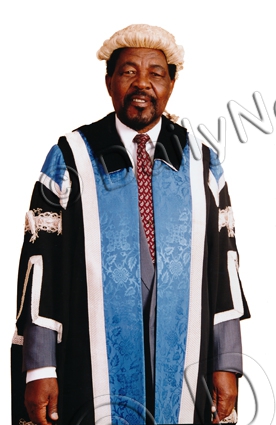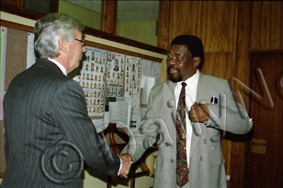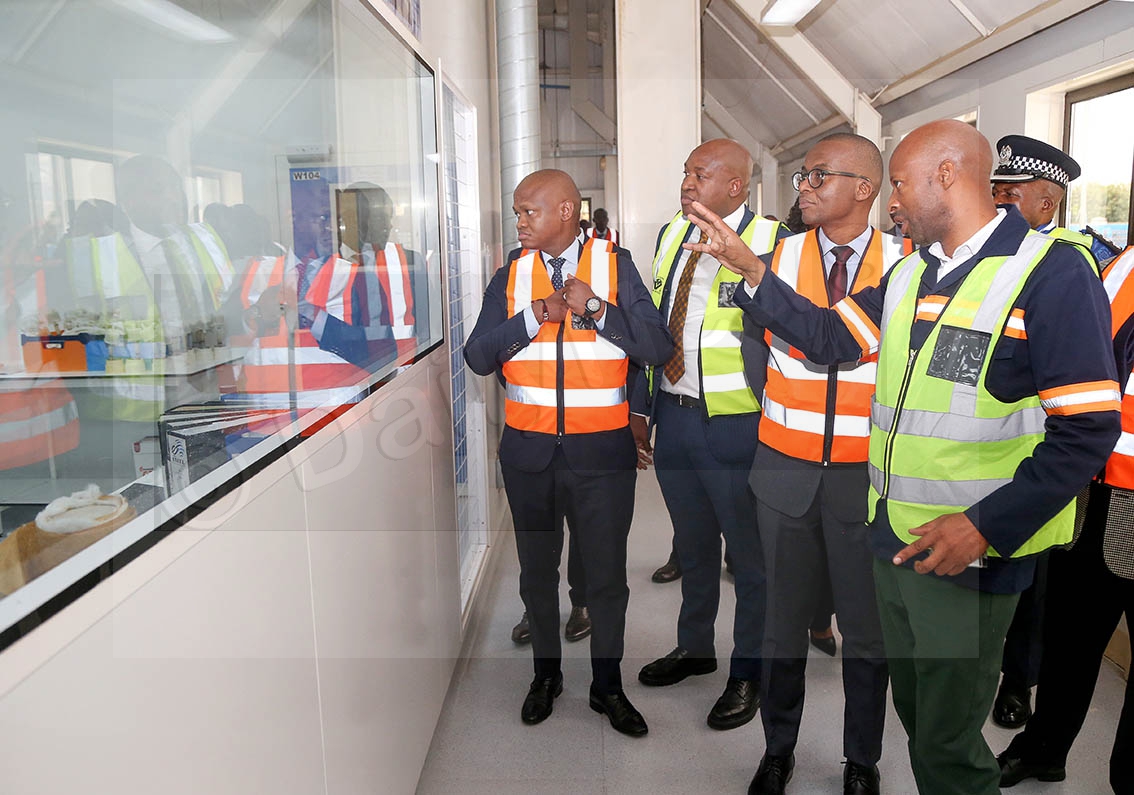Matlapeng Molomo A life well lived
08 Jan 2020
Matlapeng Ray Ridwell Molomo, who died on Christmas Day at Gaborone Private Hospital and was buried in Mochudi last Friday, was due to celebrate his 90th birthday on Thursday.
He was born on January 9, 1930, a year after the installation of Kgosi Molefi, Kgosi Linchwe II’s father.
His death caught many in Botswana by surprise because they had never heard of his illness.
But those closer to him were not surprised because they knew he had been in and out of hospital for some time.
A few of them knew that his illness was life threatening. Even in pains, Molomo was not only thinking of his recovery.
He was still able to express concern about Mochudi.
But his hope was that things would ultimately change for the better because ‘leaders come and go while institutions remain’.
Ray Molomo could afford to miss the BDP’s massive launch of Mmusi Kgafela as the party’s parliamentary candidate in the last general elections, but he could not afford to miss the casting of a vote.
He has voted in every election in Botswana, but he considered the last general elections as more crucial than the rest.
According to his widow, Motlhagodi Molomo, his children literally carried him from his bed to the voting station.
He had insisted that for as long as he was still breathing, he should vote.
Ever since his death, his home at Raserura had been a hive of activities with people of varying ranks arriving to pay homage to the family and relatives.
Old and long time friends who made the journey to the Molomos between the date he died and the funeral include Archibald Mogwe, the man who poached Ray Molomo as a teacher from Kgari Sechele Secondary School in Molepolole to Isang Secondary School in Mochudi, where the1961 Junior Certificate results were poor, Daniel Kwelagobe with whom he was an ally during the BDP intense factions, David Mogami, Charles Tibone, Chief Justice Trrence Rannowane, former Vice President Ponatshego Kedikilwe, author and former Cabinet Minister David Magang, former president Festus Mogae, former Speaker of the National Assembly Patrick Balopi, Justice Motumisi of the High Court, former MP for Kgatleng East Isaac Mabiletsa, former MP for Mogoditshane, Sedirwa Kgoroba and several present day Cabinet Ministers.
President Dr Mokgweetsi Masisi was almost a resident at the Molomo compound before and after Molomo’s death.
It was not surprising to hear the close to 20 speakers listed in the funeral programme taking turns to describe him as an all rounded personality, motivational to the young and elders alike, displaying a sense of humour and as an iconic giant.
Those who spoke at his funeral said a lot, however there was more which was not said, perhaps because of time constraint.
At the least they underlined the fact that he was opposed to corruption in all its forms.
Ray Molomo seemed to have come from a different world as he developed a totally different set of values.
Although he was well up, he was not living life high up in a world of executive clubs of the people who see themselves as more important than others.
He belonged to a class of people who played everything by the rules.
For instance, around 1980, Ray Molomo was a new member of the Botswana Meat Commission (BMC) board.
When he arrived, he found out that corruption in the meat industry was rampant.
Some people had made big bucks through what the BMC called the Female Graciers Scheme.
The scheme empowered participants in the field of cattle rearing and increased the national head.
It appears after some time, participants were expected to return the cattle to the BMC.
Some of them defaulted and no action was taken against them until the arrival of Ray Molomo, who began digging deeper into the scandal.
It was found that some of them owed the BMC millions of Pula and were seating comfortably in their homes not expecting to be asked to account.
However, their expectations were short-leaved as they were forced through court proceedings to pay back what they owed.
This is one area which is never included when Ray Molomo’s achievements are recounted because it is an event known only to a few.
Ray Momolo’s political life story is often distorted, hence the need for it to be put in its proper content.
For instance, it is a matter of debate as to whether he was indeed the first Botswana National Front (BNF) president.
He is described as such in one of the Whatsapp posts by a former BNF activist.
Even on the funeral day, one speaker told mourners that he was the first BNF president.
In his book, Democratic Deficit in the Parliament of Botswana, this issue appears unambiguous.
This is what he says,“On 10 0ctober 1966, a little over a month before independence, the Botswana National Front was launched at Mochudi, the home village of Ray Molomo, who did not attend the launch meeting because teachers were prohibited by law from taking active part in politics.
Ray Molomo was elected the first president of the new party in absentia, but later declined as he would have had to resign from teaching if he had accepted that position”.
The only thing which is wrong in his version is the date in which the party was launched.
According to a hand-written letter of October 6, 1965 from a man called Henderson Tlhoiwe to Kgosi Linchwe, BNF was launched on October 3, 1965.
Tlhoiwe was elected the party secretary-general on that day.
Molomo had met Dr Kenneth Koma while the latter was lecturing at Serowe Teachers Training College.
Molomo had arrived the previous year from Canada, where he had been studying Educational Psychology at the University of Ottawa.
According to Molomo, Koma ‘appeared like a bolt from the blue’ after studying for a doctoral degree in political economy at the Africa Institute, Academy Sciences of Moscow in Russia.
They became acquainted to each other and agreed that there was the need for a new political party with a completely different ideology.
That is how Molomo became a member of the BNF and later suggesting that the party’s newsletter be called Phuophaa (straight talk).
The period around 1977 was a turning point in Ray Molomo’s political journey.
He got disillusioned with the BNF and dumped them for BDP.
Tlhoiwe did not entertain Molomo’s idea, stating that it would be a terrible mistake for such a man with a ‘progressive mind’ to be associated with a ‘social order that exploited the masses’.
Like Dr Koma, Tlhoiwe was a graduate of Charles University in Prague, Czechoslovakia.
Kgosi Linchwe asked what Molomo would do if the BDP welcomed him in their ranks and decided to sideline him.
Molomo explained that he would go to the congresses and conferences where he would make his voice heard by the masses during debates.
That way, Molomo reasoned that the delegates would begin to shame the leadership by questioning them to explain why he was being sidelined if they saw him being strongly effective.
That would put pressure on the leadership to use him, he said.
The response satisfied the chief as he became enthusiastic about the prospect of Molomo joining the BDP.
Kgosi Linchwe had always admired Molomo as a man of high intellect.
Molomo was 47 when he joined the BDP.
This means that he spent 42 years as a BDP member who went on to become MP for Mochudi, Minister of Education and the Speaker of the National Assembly, the position which put him on number four in terms of the country’s order of precedence.
It is clear that had he not joined the BDP, his highest achievements would have been as a university lecturer and permanent secretary position only.
He had missed the opportunity of joining the BDP on the day it was launched under a morula tree in Gaborone.
He had travelled to the launch in the company of his father Sefako Pilane, his elder brother, Norman Molomo and MA Maribe.
They all joined the BDP then, but Ray Molomo did not because he was unimpressed by its policies.
His book, Democratic Deficit in the Parliament of Botswana traces the history of politics and society from the pre-independence days to the present.
It is a book for serious-minded readers.
Magang says it ‘is intimidating by its size, but it is worth reading’ as it is educative.
This is what Baleka Mbete, former Speaker of South Africa’s Parliament says about it in her foreword,
“The text is a standard work on Botswana parliamentary practice and democracy.
It is a rich compendium of information, analysis and critical observation, which go a long way towards helping readers and observers to understand the story of Botswana’s success”.
He started his prolific writing when he authored Sebaga Sa Lerato, a Setswana novel that was used as a set book at secondary schools.
His other Setswana book on culture is yet to be published.
Ray Molomo was not only an educationist or politician, he was a football fanatic who earned himself the nickname ‘Shaluza Max’ during his playing days.
There have been calls for government’s proposed new stadium to be built in the Gaborone surroundings to be named after him because of him being the founder of super league in Botswana as president of Botswana Football Association.
It was in 1967 when he founded the super league with seven teams from Lobatse, Gaborone, Mochudi and Mahalapye.
The teams were; Township Rollers, Gaborone United, Queen’s Happy Hearts, United Terrors, Maletamotse, Mochudi Rovers and Queens Park Rangers.ENDS
Source : BOPA
Author : Kwapeng Modikwe
Location : Mochudi
Event : Orbituary
Date : 08 Jan 2020






